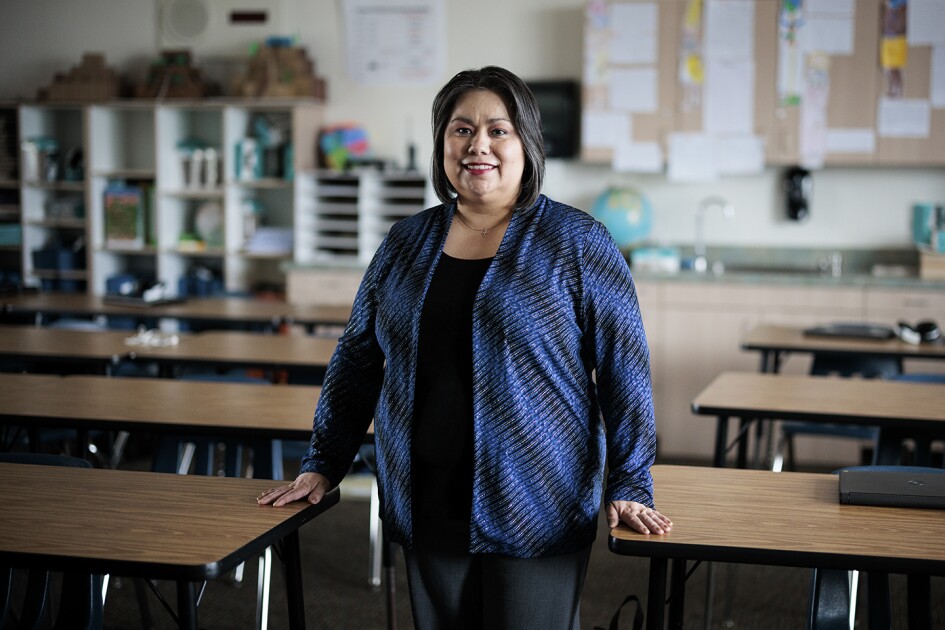UPDATED
In his first speech to the nation as president, the newly inaugurated Donald Trump painted a dark picture of an America that has left struggling middle-class families behind, including a public school system that spends big while getting poor results for students.
“Americans want great schools for their children, safe neighborhoods for their families and good jobs for themselves,” Trump said in his address from the U.S. Capitol to a packed crowd of onlookers. “But for too many of our citizens, a different reality exists. ... An education system flush with cash but which leaves our young and beautiful students deprived of all knowledge.”
Trump—who in his final campaign push promised to “drain the swamp” of special interests in Washington—also pledged to make Washington a place where the needs of people, not politicians, are paramount.
“While they celebrated in our nation’s capital, there was little to celebrate for struggling families all across our land,” Trump said.
Trump, a real estate developer and reality television star who had never held public office, made no mention of school choice in his speech. But during the campaign, he pitched a $20 billion school voucher program. His choice of Betsy DeVos, a Michigan political mega-donor and school choice advocate, shows he’s serious about expanding school choice now that he’s in the White House. And the rhetoric in his inaugural speech suggests he’ll sell the proposal by making the case that public schools are failing.
Anne McCandless, an Advanced Placement government teacher at Providence High School in Charlotte, N.C., who brought her class to Washington to see the inauguration, said she felt stung by Trump’s remarks.
“I’m offended because I’m a 25-year veteran teacher and so he is telling me that I haven’t done anything,” she said. “There’s always room for improvement. There’s always room to change, but that’s insulting.”
Bobby Howard, a social studies teacher at Gainesville Middle in Georgia, who also attended the inauguration with his students, said the reality at his charter school doesn’t match Trump’s rhetoric.
“I know he said the system is a disaster. I don’t think it’s a disaster,” Howard said. But he added that resources for education could be better distributed.
But Tom Macluskie, who retired in May after 26 years of teaching social studies at Gainesville Middle School, and joined his former colleagues and students on the mall Friday is hopeful that Trump can be a change agent.
“I think he’s going to do a very, very good job,” Macluskie said. “He’s definitely not politically correct, but that may work to his advantage. ... This is almost an experiment.”
Complex Picture
Though Trump’s inaugural rhetoric was harsh, the national picture on student outcomes is a complex one. Graduation rates are at an all-time high of 83.2 percent, and graduation gaps are closing between white and minority students. But in 2015, scores on the National Assessment of Educational Progress, the nation’s report card, fell in math and reading for the first time in more than two decades.
On the funding side, the Center on Budget and Policy Priorities, which focuses on reducing poverty and inequality, found that 35 states provided less overall state funding for education in 2014 than in 2008, before the recession hit housing prices, sending down waves of state and local budget cuts to school districts. In fact, in 27 states per pupil funding fell over the same period.
The federal government, which Trump will now control hasn’t made up for those cuts. Since 2011, spending on major K-12 programs—such as Title I grants for disadvantaged students and special education—has been relatively flat.
Trump’s populist rhetoric of bringing to change to Washington was a staple of his campaign speeches. But Jack Jennings, who served for decades as a top aide to Democrats on the House education committee said he found it hard to square those promises with his choice of DeVos, who he said stumbled to show her knowledge of basic education polices, such as federal education laws, in her confirmation hearing.
“I’m incredulous that he says he’s going to bring about better schools with a small group of billionaires as his advisers,” Jennings said. “He says he is going to change schools with a woman who has no idea how schools operate.”
But Jay Greene, a professor of education reform at the University of Arkansas, said while Trump used an “obvious overstatement” to describe the state of America’s schools, his views are pretty common.
“It does seem to signal that he thinks the challenges in our education are not solved by increased spending,” Greene said. “And that is not an extreme view. That’s a common view, even if not the majority view.”
Women’s March
Trump’s inauguration isn’t the only big event happening in Washington this week. Thousands of women—including at least 1,000 union members—are headed to Washington for another event Saturday, the Women’s March. Holly Daniels, a first grade teacher at Riddle Elementary in Lansing, Mich., plans to hop on a bus Friday night for a ten-hour trip.
“We have a businessman as a governor in Michigan and it has not been good,” Daniels said. “I’m concerned that we’re going to see things that have happened in Michigan at a national level,” including an explosion of charter schools, cuts to education, and public health problems like the water crisis in Flint. “A year later these people still don’t have clean water. I’m concerned about Donald Trump’s [rhetoric] about women, sentiments about minorities.”
Participating in the march “makes me feel like I’m doing something other than sitting at home and complaining,” she said. “I’m looking forward.”





